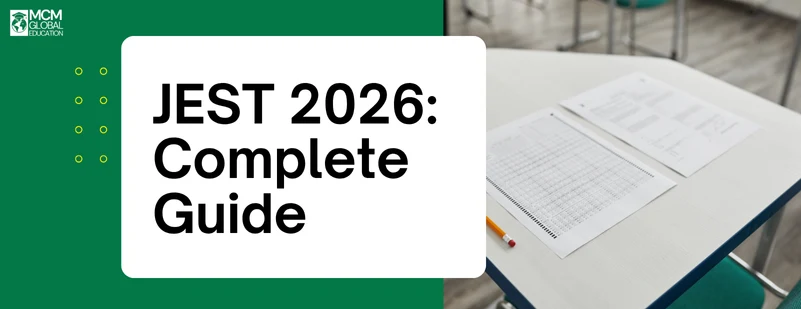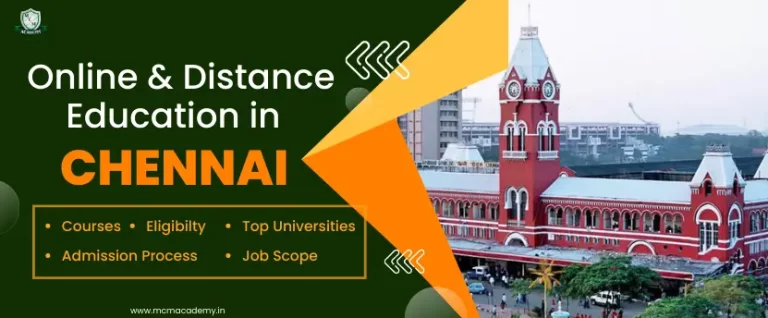If you are aspiring to pursue a PhD or Integrated PhD in Physics, Theoretical Computer Science, or Computational Biology, then JEST 2026 is your gateway. The Joint Entrance Screening Test (JEST) is a national-level exam conducted every year for admission to research programs in India’s premier institutes.
This detailed blog provides a comprehensive guide to JEST 2026 — covering eligibility criteria, exam pattern, syllabus, important dates, application process, cut-offs, preparation strategies, and more. Whether you are a first-time candidate or repeating the exam, this is your all-in-one reference for JEST 2026 preparation.
Table of Contents
What is JEST?
JEST 2026 (Joint Entrance Screening Test) is a prestigious examination that serves as a common screening test for admission to research programs (PhD and Integrated PhD) in several science and research institutes across India.
It is recognized by the Science & Engineering Research Board (SERB) as a National Eligibility Test for research fellowship programs. Institutes such as IISERs, NISER, IMSc, IOP, and TIFR consider JEST scores for admission into their PhD or Integrated PhD programs.
The exam primarily evaluates candidates’ understanding of advanced concepts in Physics, Theoretical Computer Science, and Computational Biology.
Key Highlights of JEST 2026
| Feature | Details |
|---|---|
| Exam Name | JEST 2026 (Joint Entrance Screening Test) |
| Exam Level | National |
| Conducting Body | To be announced (rotates among research institutes) |
| Exam Mode | Offline (Pen & Paper) |
| Exam Duration | 3 Hours |
| Type of Questions | Multiple Choice Questions (MCQs) |
| Exam Language | English |
| Validity of Score | One Year |
| Accepted By | 30+ Research Institutes across India |
| Official Website | jest.org.in (expected) |
Eligibility Criteria for JEST 2026
Before applying, candidates must ensure they meet the JEST 2026 eligibility criteria. The eligibility varies according to the program chosen.
| Program | Eligibility Criteria |
|---|---|
| PhD in Physics | M.Sc. in Physics or related field such as Applied Physics, Mathematics, or Electronics |
| PhD in Theoretical Computer Science | M.Sc. / M.Tech. / M.E. in Computer Science, Information Technology, or related areas |
| PhD in Neuroscience / Computational Biology | M.Sc. / M.E. / M.Tech. / MCA in Science, Mathematics, or Engineering with strong mathematical background |
| Integrated PhD / MSc-PhD | B.Sc. (Physics) or B.Tech. / B.E. degree holders in relevant disciplines |
Additional Conditions:
- There is no upper age limit to appear for JEST 2026.
- Candidates appearing in the final year of qualifying exams are also eligible.
- There is no restriction on the number of attempts.
JEST 2026 Important Dates (Tentative)
| Event | Tentative Date |
|---|---|
| Notification Release | May 2026 (2nd Week) |
| Online Application Start Date | May 2026 |
| Last Date to Apply | June 2026 |
| Admit Card Release | June 2026 |
| JEST 2026 Exam Date | June 2026 |
| Answer Key Release | July 2026 |
| Result Declaration | July–August 2026 |
| Interview / Counselling | August 2026 onwards |
Note: Dates may change based on the official notification. Always refer to the official JEST website for the final schedule.
Application Process and Fees
Steps to Apply for JEST 2026
- Visit the official JEST 2026 website.
- Register using your name, email, and phone number.
- Fill in the online application form with personal, academic, and exam details.
- Upload the required documents (photo, signature, and certificates).
- Pay the application fee online.
- Submit and download the confirmation page for records.
Application Fees (Expected)
| Category | Application Fee |
|---|---|
| General / OBC (Male) | ₹950 |
| SC / ST / EWS / PwD / Female Candidates | ₹475 |
| SC/ST Female Candidates | May be exempted (as per notification) |
Mode of Payment: Online (Credit/Debit Card, Net Banking, UPI)
JEST 2026 Exam Pattern and Marking Scheme
Understanding the JEST 2026 exam pattern helps candidates plan their strategy efficiently.
| Section | No. of Questions | Marks per Question | Negative Marking |
|---|---|---|---|
| Part A | 15 | 3 | −1 for incorrect answer |
| Part B | 10 | 3 | No negative marking |
| Part C | 25 | 1 | −1/3 for incorrect answer |
Total Duration: 3 Hours
Total Marks: 100 (approx.)
Key Points:
- The exam is offline and based on multiple-choice questions (MCQs).
- Candidates must choose the correct answer carefully, as negative marking applies in most sections.
- Time management and accuracy play a major role in scoring well.
JEST 2026 Syllabus
The JEST 2026 syllabus is designed to test candidates’ advanced understanding of Physics, Theoretical Computer Science, and related topics.
Physics Syllabus:
- Mathematical Methods: Linear Algebra, Calculus, Differential Equations, Fourier Series, Probability
- Classical Mechanics: Newtonian Mechanics, Lagrangian and Hamiltonian Formulations, Oscillations
- Electromagnetism: Maxwell’s Equations, Electromagnetic Waves, Radiation
- Quantum Mechanics: Schrödinger Equation, Angular Momentum, Perturbation Theory
- Thermodynamics and Statistical Physics: Laws of Thermodynamics, Partition Function, Ensembles
- Electronics and Instrumentation: Diodes, Transistors, Operational Amplifiers
- Optics and Waves: Interference, Diffraction, Polarization
Theoretical Computer Science Syllabus:
- Algorithms and Data Structures
- Automata Theory and Computability
- Complexity Classes
- Graph Theory and Combinatorics
- Probability and Statistics
Computational Biology / Neuroscience:
- Mathematical Modeling
- Systems Biology
- Neural Networks
- Bioinformatics Fundamentals
| Subject Area | Core Topics | Approx. Weightage |
|---|---|---|
| Mathematical Methods | Algebra, Calculus, Probability | 15% |
| Classical Mechanics | Kinematics, Dynamics, Oscillations | 15% |
| Quantum Mechanics | Wave Functions, Operators, Spin | 20% |
| Statistical Physics | Ensembles, Thermodynamics | 15% |
| Electromagnetism | Maxwell’s Equations, Fields | 10% |
| Electronics & Optics | Circuits, Waves, Lasers | 10% |
| Theoretical CS / Comp. Biology | Algorithms, Models | 15% |
JEST 2026 Expected Cut-Offs and Trends
The JEST 2026 cut-off will depend on the number of candidates, difficulty level, and available seats in participating institutes.
| Program | Expected Cut-Off Marks |
|---|---|
| PhD (Physics) | 36 – 40 marks |
| PhD (Theoretical Computer Science) | 32 – 36 marks |
| Integrated PhD / MSc-PhD | 28 – 32 marks |
Previous Year Trends:
- The exam difficulty level is moderate to high.
- Around 18,000+ candidates appear each year.
- Top research institutes may call only 5–10% of candidates for interviews.
Preparation Strategy for JEST 2026
Step-By-Step Study Plan
| Phase | Duration | Strategy |
|---|---|---|
| Phase 1: Foundation Building | 1–3 Months | Cover basics of Physics and Mathematics. Make short notes for formulae. |
| Phase 2: Concept Strengthening | 3–6 Months | Practice problem-solving and numerical questions. Solve previous year papers. |
| Phase 3: Revision and Mock Tests | 1–2 Months | Attempt full-length tests, analyze performance, revise weak areas. |
Smart Tips:
- Solve previous years’ question papers to understand question patterns.
- Maintain a formula sheet and revise it daily.
- Focus on conceptual clarity rather than rote memorization.
- Manage your time effectively — aim for speed with accuracy.
- Stay updated with official notifications.
Recommended Resources:
- Books:
- Concepts of Physics – H.C. Verma
- Introduction to Quantum Mechanics – Griffiths
- Mathematical Methods for Physicists – Arfken
- Algorithms and Theory of Computation – Cormen
- Mock Tests: Practice at least 10 full-length mock exams.
Admit Card, Exam Day Instructions, and Answer Key
Admit Card:
- The JEST 2026 Admit Card will be released a few weeks before the exam.
- Candidates must download it and verify details like name, roll number, exam centre, and timings.
Exam Day Guidelines:
- Reach the exam centre at least 45 minutes early.
- Carry your admit card and valid photo ID.
- Avoid carrying mobile phones, calculators, or any electronic devices.
- Manage time wisely and attempt easy questions first.
Answer Key:
- The official answer key is usually released within one week of the exam.
- Candidates can calculate their approximate score using the answer key.
JEST 2026 Result, Merit List, and Counselling
Result Declaration:
- The JEST 2026 result is expected by July or August 2026.
- It includes total marks, sectional marks, and qualifying status.
Merit List and Selection:
- Shortlisted candidates are called for interviews or counselling by participating institutes.
- Selection is based on JEST score, academic record, and performance in interviews.
Counselling Process:
- Shortlisted candidates apply to institutes of choice.
- Institutes shortlist based on JEST rank.
- Interviews or written tests may follow.
- Selected candidates receive admission offers.
FAQs – JEST 2026
Q1. What is the full form of JEST?
A: JEST stands for Joint Entrance Screening Test.
Q2. Can I apply for JEST 2026 after B.Sc.?
A: Yes, for Integrated PhD programs, B.Sc. Physics graduates are eligible.
Q3. Is there an age limit for JEST 2026?
A: No, there is no specific age limit.
Q4. How many times can I attempt JEST?
A: There is no restriction on the number of attempts.
Q5. What are the top institutes accepting JEST scores?
A: IISERs, NISER, IMSc, TIFR, IOP, and others.
Conclusion
The JEST 2026 exam offers a golden opportunity for aspiring researchers to enter India’s top research institutes. A focused study plan, consistent practice, and conceptual clarity can help you secure a strong rank.
Start early, plan strategically, and dedicate time to mastering core concepts. Stay consistent, revise regularly, and attempt mocks under timed conditions.
With the right preparation, JEST 2026 can be your gateway to a successful research career in Physics, Theoretical Computer Science, or Computational Biology.























